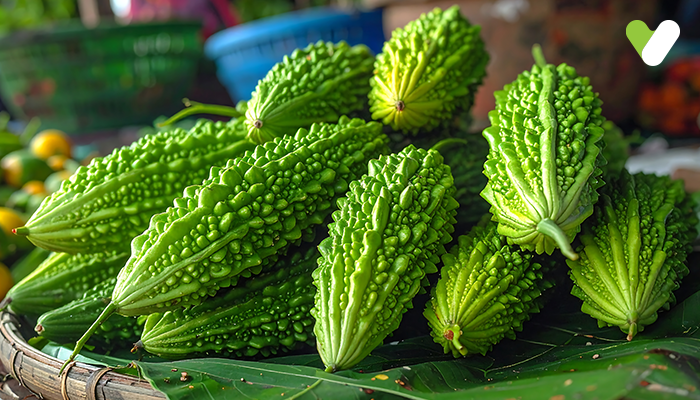Karela, also known as bitter gourd or bitter melon, is a vegetable that belongs to the cucumber family. It is a tropical fruit that is commonly found in Asia, Africa, and the Caribbean. Karela is known for its unique bitter taste and is often used in traditional medicine to treat a variety of ailments, including diabetes, high blood pressure, and skin problems.
Karela is rich in nutrients such as vitamins A and C, folate, and potassium as well as antioxidants and phytonutrients. It is also low in calories and carbohydrates, making it a great addition to a healthy diet.
To get a better understanding of the miraculous bitter gourd benefits, you can visit a search engine and type in the search box bitter gourd benefits, karela benefits, bitter gourd health benefits, and bitter gourd uses.
Nutritional value of Karela
There are several benefits of bitter gourd because of the different nutrients and vitamins present in it. Bitter gourd has few calories. A bitter gourd contains roughly 19 calories per 100 gram.
In 100 gram of karela, there are about 3.5 gram of carbohydrates, and 2.4 gram of fibre, but only 150 milligram of fat and 930 milligram of protein. In addition, it contains a lot of water content of 87 gram.
Vitamin C and A are abundant in karela. Additionally, bitter gourd contains minerals like folate, potassium, iron, and zinc. Karela provides antioxidants including gallic acid, catechin, chlorogenic acid, and epicatechin, which aid in preventing several illnesses.
11 miraculous Karela Benefits
1. Good for diabetes
One of the important bitter gourd uses is its ability to help lower blood sugar levels by increasing insulin sensitivity and promoting glucose uptake by the cells with the help of a compound called charantin. Karela also contains polypeptide-p, a compound that mimics the action of insulin in the body and helps regulate insulin secretion, thereby helping to control blood sugar levels.
2. Good for hair and skin
Another bitter gourd benefit is that it is rich in antioxidants, which may help reduce oxidative stress and damage to the skin and hair caused by free radicals. Bitter gourds contain anti-inflammatory compounds, which can assist in reducing inflammation in the skin and scalp and improve overall skin health.
3. Liver cleanser
Karela contains compounds that can help stimulate the liver to produce enzymes that aid in the detoxification process, which may help remove harmful toxins and waste products from the body. Karela is rich in antioxidants, which may help protect the liver cells from oxidative stress and problems caused by free radicals.
4. Helps digestion
Karela is a rich source of dietary fibre, which can assist in improving digestion and promote bowel regularity. Karela contains several digestive enzymes, including amylase, protease, and lipase, which may aid in the breaking down of carbohydrates, proteins, and fats, respectively.
5. Promotes heart health
Karela has been shown to lower cholesterol levels, which can assist in reducing the risk of heart disease. Karela is a rich source of potassium. Potassium reduces the risk of heart disease and helps regulate blood pressure.
6. Fights cancer
Karela is rich in antioxidants, which may help protect the body from oxidative stress and problems caused by free radicals. This can assist in lowering the risk of cancer by preventing damage to DNA and other cellular components. Karela has been shown to have immunomodulatory effects, which means that it can help regulate the immune system. This can help the body fight off cancer cells and prevent their growth.
7. Help in maintaining weight
Karela is rich in fibre and low in calories; this can assist in reducing the overall calorie intake and promoting the feelings of fullness. With bitter gourd, adipose cells, which are responsible for storing fat in the body, are prevented from forming and spreading. It enhances metabolic processes, and the antioxidants aid in the body's detoxification, which reduces fat.
8. Help in wound healing
Karela contains anti-inflammatory compounds, which may help reduce inflammation at the wound site and promote healing. Karela has been shown to have antibacterial properties, which could help prevent infection at the wound site.
9. Acts as a blood purifier
Due to its strong antioxidant content, karela can be used to treat a variety of conditions that are caused by contaminated blood. Regular consumption of bitter gourd helps keep cancer, hair, and skin issues at bay. Additionally, it aids in enhancing blood circulation.
10. Provides energy to the body
One of the bitter gourd health benefits is that it provides energy to the body. Its nutrient content can certainly support overall health and well-being. For example, karela is a good source of vitamins C and B6, which are important for energy metabolism.
11. Promotes eye health
Karela is a good source of vitamin A, an essential component for the maintenance of healthy eyesight. Moreover, vitamin A plays a key role in the production of rhodopsin, a protein in the eyes that helps to detect light and transmit visual signals to the brain. A deficiency in vitamin A may lead to night blindness and other eye problems.


